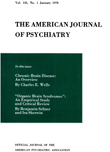INVOLUTIONAL ILLNESSES
Abstract
Judging from a study of 379 sanitarium patients with follow-up information on 114, the previously reported effectiveness of convulsive therapy in involutional psychoses, especially in depressions, is reaffirmed, as is the low incidence of complications with such therapy. At present, convulsive therapy, supplemented by less intensive psychotherapy (as contrasted with psychoanalysis) appears to be the therapeutic program of choice in these patients. With a therapeutic orientation, the diagnostic term involutional psychoses appears to retain its usefulness. Further study of motor discharge in induced convulsions may help elucidate the mechanisms of psychotic depressions. Other long-range follow-up studies would be of value in determining the future course and ultimate results of electroconvulsive therapy in patients who have suffered from involutional illnesses.
Access content
To read the fulltext, please use one of the options below to sign in or purchase access.- Personal login
- Institutional Login
- Sign in via OpenAthens
- Register for access
-
Please login/register if you wish to pair your device and check access availability.
Not a subscriber?
PsychiatryOnline subscription options offer access to the DSM-5 library, books, journals, CME, and patient resources. This all-in-one virtual library provides psychiatrists and mental health professionals with key resources for diagnosis, treatment, research, and professional development.
Need more help? PsychiatryOnline Customer Service may be reached by emailing [email protected] or by calling 800-368-5777 (in the U.S.) or 703-907-7322 (outside the U.S.).



